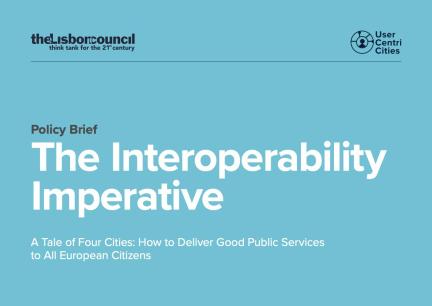The Lisbon Council, as part of the UserCentriCities consortium, has released a policy brief titled "The Interoperability Imperative: A Tale of Four Cities".
This document provides detailed insights into successful interoperability implementations in Ghent, Milan, Kyiv, and Tallinn. The significance of the proposal for an Interoperable Europe Act in enhancing digital services across Europe, improving user experience, and promoting inclusivity in the digital society is also a focal point of the document.
Kyiv – digital services in crisis
The report highlights the exceptional resilience and progress of Kyiv, the capital of Ukraine. Despite the challenges faced, Kyiv's digital team has developed efficient digital services which have quickly become essential tools for the citizens.
Kyiv Digital, the city's digital application, originated as a simple transport app providing access to free parking slots and public transport tickets. Over time, it transformed into an ecosystem of digital services, which includes e-democracy tools. The app is fully interoperable with Diia, Ukraine’s advanced document sharing service, allowing people to easily share documents. In addition, it is integrated with various national registries such as the state registry of vehicles, the registry of administrative offences, the State Tax Service, BankID, and various payment systems.
With the onset of conflict, Kyiv Digital quickly added new vital features, transforming it into a life-saving tool. Thanks to a robust, modular service-oriented architecture and previous investment in interoperability, Kyiv was able to launch new services in response to evolving demands.
Milan – one landing page, many services
Milan, Italy's example of the "Citizens' Digital Folder", also stands out. The city started working on the project in 2017 to create a single landing page where various administrative offices could integrate their services. The digital folder provides integrated access to data held in separate registries, ranging from education to car ownership. This unified access simplifies processes for citizens, allowing easy management of personal documents, certificates, payment of municipal fees and traffic fines.
Ghent – interoperability putting the human in the centre
In Ghent, Belgium, proactive service delivery plays a pivotal role in the city's digital transformation. Ghent has taken a human-centric approach, linking proactive service delivery with poverty reduction. The city provides free garbage bags to low-income citizens, automatic reductions and discounts for daycare and school expenses to parents with low income, and significant reductions for cultural and sports activities. These services are made possible through interoperability among national, regional, and local registries, as well as the Maximum Data Sharing between Administrations and Agencies (MAGDA) platform.
Tallin - 3D maps for better urban planning


Tallinn, Estonia, has been an excellent example for e-government for many years. In this report, the city shines with its three-dimensional (3D) city planning project. By using a robust interoperability infrastructure, this service offers a realistic visualisation of the city, helping citizens, architects, and urban planners to better understand project proposals' impact. Data interoperability is facilitated by the Geographical Information Systems (GIS) Department of Tallinn, which manages a 3D map of the city that relies on data exchange between national and local level registries.
The policy brief concludes with a four-point roadmap that calls for various steps forward in delivering interoperability at scale across Europe, taking advantage of the opportunity provided by the future-looking European Commission proposal for Interoperable Europe Act.
Curious to know more? Deep dive and read the whole report of “The Interoperability Imperative”.
* UserCentriCities is a Horizon 2020 project that started in December 2020. Led by the Lisbon Council in partnership with Eurocities and VTT Technical Research Centre of Finland, it brings together 26 European municipalities and regions; the founding partners – Espoo, Milan, Murcia, Rotterdam, Tallinn and Emilia Romagna – and participating cities and regions: Arezzo, Barcelona, Catalonia Region, Brussels Capital Region, Ghent, Glasgow, Gothenburg, Helsinki, Kronoberg Region, Kyiv, Lisbon, Ljubljana, Madrid, Mataró, Olesa de Montserrat, Paris, Porto, Riga, Terrassa and Utrecht.

